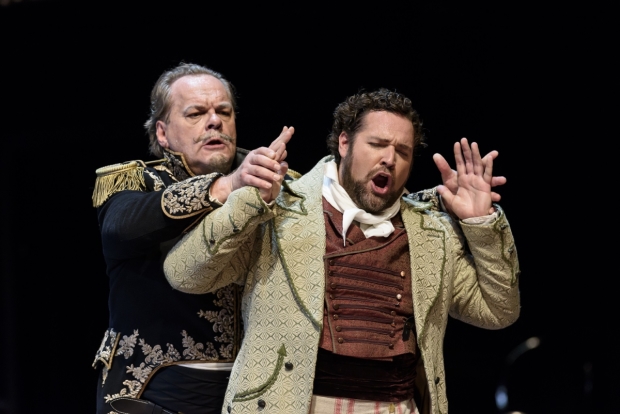Review: Les Vêpres siciliennes (Royal Opera House)

© Bill Cooper
Gasp! As Philipp Fürhofer's monumental sets roam the stage and interlock with the grace of a docking spaceship.
Thrill! As the political romance grows ever sillier and tips the four-hour mark.
Melt! As a company of A-list talent steers the monster home.
Wonder… what the hell’s going on, as Stefan Herheim‘s wayward staging obfuscates a little-known story.
Anyone who’s (a) familiar with the opera or (b) willing to do an hour’s prep will probably follow most of the action in Les Vêpres siciliennes, but should that really be a prerequisite for an evening’s entertainment? Music ought to be a pleasure, not a slog, and if it fails to communicate on its own terms then it has failed absolutely. This was my second encounter with Herheim’s production and I kind of get it now, but I heard punter puzzlement at every turn during the intervals. I don’t blame them.
The problem is that Verdi and his librettists are telling us one story – in French-occupied Sicily, Hélène is held hostage by the ruthless Montfort and turns to Jean Procida and the patriot Henri for help – while Herheim is delivering quite another: that artists are at the mercy of the rich and influential, and that art itself is corrupted by power. While the ear hears Verdi, the eye sees Herheim. What’s a poor brain to do?
'Corpse de ballet'
During the overture, boodthirsty occupiers burst into a rehearsal room where Procida is leading a barre class. Their leader, Montfort, rapes one of the dancers. (That’s it, Mr Herheim. Message delivered.) The child born of this atrocity will grow up to be Henri, a warrior for the opposing side. Thereafter, a typical Verdian tale of parental ties and torn allegiances unfolds leaving more than one corpse de ballet in its wake. By the end, surreal images (e.g. a toddler executioner) have mixed with dream sequences (the executioner now reborn as an angel, complete with wings and harp) to fry the mind.
Thank goodness for the cast, which is magnificent. The central trio of Michael Volle (Montfort), Bryan Hymel (Henri) and Erwin Schrott (Jean Procida) could hardly be starrier, nor better, and all three improve on their performances four years ago. Les Vêpres siciliennes may only be middling Verdi but it groans under the weight of fantastic dramatic arias, none better than the devastating face-off between father and son that opens Act 3. Volle is majestic, Hymel heroic. Schrott, too, is a fiercely imposing presence; his growling bass made the floorboards rumble during his declaration of loyalty to Palermo.
The role of Hélène is a tough ask for any soprano, for she needs to have spinto power with bel canto top notes. Malin Byström is blest with the first quality more than the second, but she is nonetheless a stellar tragedienne. No one else in a dizzyingly huge cast gets much of a look-in but they all serve the cause to a fault, as do Maurizio Benini and the ROH Orchestra and Chorus, a partnership that has long been steeped in Verdi.
Les Vêpres is a vast enterprise that dates from the days of Kasper Holten’s costly follies; but don’t feel guilty about watching the excess now because it was all paid for 2013. Instead, tuck up for the night and go with the flow. You won’t be bored for a minute. But a spot of homework wouldn’t come amiss.
Les Vêpres siciliennes continues in repertory at the Royal Opera House until 4 November.










